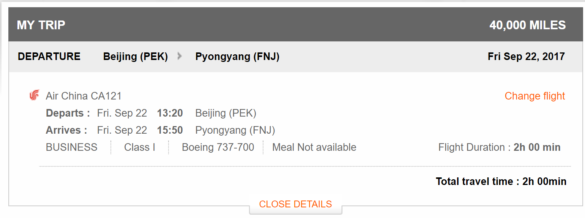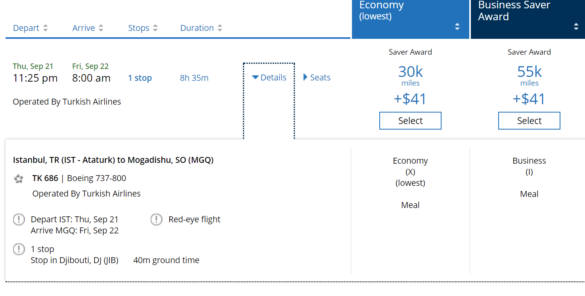Should frequent flyer programs fly you to your probable death?
Frequent flyer programs around the world prohibit the redemption of miles for certain destinations. For example, you cannot book award flights to Pyongyang using United miles on Air China, but you can use Aeroplan miles:

While Pyongyang is a politically contentious place, crime or detention reports don’t reveal that travelling to the DPRK is dangerous. However, without argument, flying to Mogadishu is very dangerous. Foreigners are often the victim of kidnappings and violent murder; airplanes landing at Aden Adde airport have to use special “spiral landing” manoeuvres to avoid land-to-air missiles. According to the United States Department of State Bureau of Diplomatic Security, Somalia, and especially Mogadishu, are hotbeds for crime, including attacks at the airport and on civilian aircraft.1
In contrast, the Department of State doesn’t have strong words against travel to the DPRK (except for the invalidity of a US passport).2 It appears that the US government doesn’t consider the DPRK as a threat to the security of travellers, just as a threat to national and political security.
I don’t know of a frequent flyer program that disallows bookings to Mogadishu, which is served by Turkish Airlines with a stop in Djibouti.

With the current escalation of threats to post-WWII international security, and the escalation of violent threats in parts of Africa and the Middle East, I have to ask – do frequent flyer programs have a moral duty to not book flights to certain destinations?
I think there are a couple aspects at play. Of course there’s the libertarian philosophy which is rather convincing, that frequent flyer programs (or any travel agency at that) have no role is playing big brother and telling us where we can and can’t go. If I want to go to Mogadishu, that’s my prerogative, and it’s my risk to assume.
On the other hand, there’s also the notion that a carrier is wilfully and knowingly sending you to a place in which you have a very good chance of being killed or kidnapped. I can easily see scenarios where someone may not fully understand the risk of their destination, or is mentally incompetent to appreciate or care about that risk. The state often plays a role in dissuading or preventing actions that bring about personal risk, such as through drug policy, and I struggle to see why the same “nanny-state” policy couldn’t be arguably applied to prevent flight bookings to extremely dangerous locations.
Further, there’s also the consideration for public policy. The United States is “at war” for a certain number of causes, and it’s seeming more and more likely that they’re going to enter into conflict with the DPRK. Allowing frequent flyer programs to make flights to enemy nations can arguably be said to be supporting an enemy state (if you fly to the DPRK, some sort of revenue will flow to the DPRK, meaning a person is funding an enemy state).
Personally, I struggle with this debate. If someone asked me to fly to the DPRK through my award booking company, I would likely decline the request. However, I have no personal issue with someone choosing to visit the DPRK, Mogadishu, Syria, etc. I am, at a fundamental level, inclined to say that frequent flyer programs should book whatever they can, without regard to the destination, based on the principles of individual choice. On the other hand, I am concerned that someone who doesn’t appreciate the risks of their travel may be enabled if they can fly somewhere on points that would normally be prohibitively expensive.
What do you think? Should frequent flyer programs prohibit bookings to certain dangerous destinations? Why?
1: https://www.osac.gov/pages/ContentReportDetails.aspx?cid=21823
2: https://travel.state.gov/content/passports/en/country/korea-north.html


I don’t see how a frequent flyer program is any different in allowing to to somewhere as paying the airline to take me there. If the airline has a route to a city and takes my money to fly me to that city why should they take my points to do the same thing. It’s just a different currency. Give me the same warnings when using points as you give me when using my credit card.
Agreed. And beyond that, if you’re going to say “they shouldn’t let me book a frequent flyer ticket there” then why not say “commercial carriers have no business flying there” as well?
I’m just concerned about my 12 hours in Seoul in Nov on RTW17. But really want to try Korean 1st class on B747-8i & A380.
Because whoever travels there is likely a criminal (mind). With internet connectivity the need to physically be somewhere dangerous is significantly smaller than 10 years ago.
First off, your title is clickbait. None of these programs are flying you “to your probable death”. Thousands of passengers a day fly through the airport in Mogadishu, and I’d wager that most of them survive the experience. Same for Pyongyang.
Second, no one wakes up in the morning and goes “I need a weekend away. Let’s see if there’s award space to Somalia.” People flying to these places are aware of the risks and are going for a specific reason (and no, they’re not “likely a criminal” Jacob – WTF?)
I’m surprised you wouldn’t book someone an award ticket to Pyongyang. North Korea isn’t actually an enemy of Canada, and it’s hardly the only country where tourist dollars support a regime that mistreats its own citizens. By that rationale, you shouldn’t book tickets to much of South America, Africa, Asia, even parts of the Caribbean!
If you refuse to serve a client who wants to go to North Korea because of your own philosophical beliefs, is that any different from the baker who refuses to make a cake for a gay wedding?
(1) I’m a blogger. Unfortunately, clickbait is the name of the game. Sucks but you need it to survive here. (2) You’d be surprised how many people I chat with have almost no idea about the place they’re visiting. It’s common. I’m especially concerned with enabling young people or those with mental illness to fly to a place that may be a substantial and real threat to their security. Now, if you read the article, you’d note my statement saying that I have no problem with somebody going to these places. Hell, I’d love to go. However, the article was trying to spark a debate as to whether there is some moral and/or policy justification to create restrictions.
(3) I probably wouldn’t book a client to Pyongyang or Mogadishu for different reasons. Again, as stated in the article, Pyongyang is a safe place. I personally wouldn’t book somebody there through my company for a number of personal reasons, one of those being potential bad legal or PR liability. I also have no clue what’s going on with the Dprk and the US, somewhere I travel frequently. I don’t know if future US policy would cause me trouble as enabling someone to go to an enemy state. It’s a “better safe than sorry” situation. Now for Mogadishu (or Syria, mainland Yemen, etc.) I wouldn’t book a client there simply because I don’t understand my legal liabilities with regards to cautioning a client regarding risk, and frankly, it’s a lot easier to reject these requests (which I haven’t ever had) than spend the time researching the issue. It’s a business decision.
(4) I hope you recognize that your bakery comparison is ridiculous hyperbole. Refusing service based on protected human rights grounds is totally different than refusing to book a flight to a dangerous/contentious land. Ridiculous.